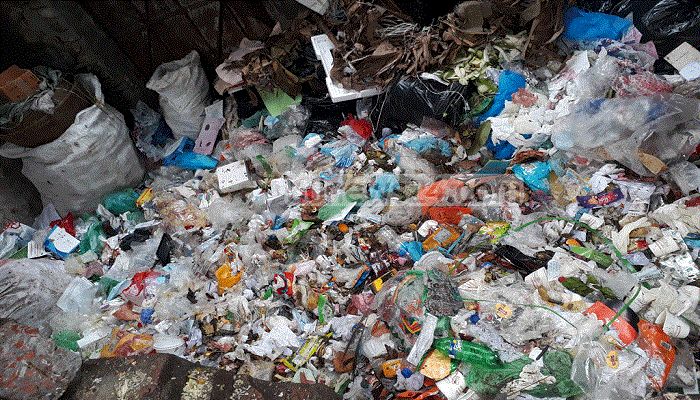
Desk Report
Publish: 15 Jul 2021, 11:56 am

Coronavirus-related medical waste (Photo: Collected)
The authorities have yet to
demonstrate any effort to safely manage coronavirus-related medical waste while
the Covid-19 pandemic has taken its toll across Bangladesh.
Covid-19 related waste from
hospitals is widely spreading in urban areas. But with the exception of a few
very conscious hospitals and institutions, the same kind of indifference can be
seen. Many are throwing Coronavirus safety equipment on the road after use.
These are washed away in the rainwater and drained. Going from the drain to
the bottom of the river and then into the sea is destroying biodiversity
and the environment. Masks can be seen in various trees of the capital, in the
alleys and drains of the city. Hand gloves are also being thrown away.
As per the rules, these wastes
should be disinfected and then packed in safety bags (biosafety bags). With the
exception of one or two, hospitals are not keeping waste properly. In order to
prevent coronavirus infection, washing hands with soap and water and
maintaining physical distance as well as wearing a mask is important. There is
no alternative to save lives at the moment.
Thus, about 13 million tons of
plastic waste are going to the sea every year in the world. Severe air pollution
occurs when these are burned openly, as is a common waste. On the other hand, Covid-19
related protective materials are basically disposable plastic products. These
products can survive for years on land or in water. Covid-19 related waste is
being mixed with the general waste in the house. The city corporation should
take separate initiatives in the management of which. But it turns out that
thousands of cleaners are collecting, transporting, dumping, or destroying
coronavirus-related waste without any protection. Those can be infected at any
moment. Many Covid-19 patients across the country are receiving treatment from
home. They are all using masks-gloves and other protective equipment. Experts
say that if these are not kept indoors properly or if they are shared together
with household waste, the health risks will increase.
A study by BRAC, a
non-governmental development organization, found that only 6.6 percent of
health care and medical waste was properly managed in the Covid-19 epidemic.
The remaining 93 percent is being thrown here and there!
Prism Bangladesh is the only
non-governmental organization dealing with medical waste. In the early days of
Coronavirus, they were working together with two city corporations to collect
waste from various hospitals and homes. Sources, who did not want to disclose
names, said that although the city corporation was active in the matter at the
beginning, now no one is taking action.
According to a survey conducted
by three non-governmental organizations, 206.21 tons of Covid-19 related waste
is being generated every day in the Dhaka metropolis alone. More than 49 percent of
city dwellers keep corona waste along with other waste and hand it over to city
corporation employees. Public health experts say city corporations need to
streamline their waste management systems. Measures should be taken to separate
each type of waste at its source, collect, transport, dump and destroy it
separately. The personal safety of the cleaning staff must also be ensured.
According to sources, there are
500 public and private hospitals in the capital. Apart from Sheikh Hasina
Institute of Burn and Plastic Surgery, there is no medical waste management
solution with modern microwave technology. However, Coronavirus disease is not
treated here. Earlier, these wastes were incinerated in several hospitals in
the country, including Dhaka. But now they are almost useless. There is no
management of such waste treatment in the divisional cities outside Dhaka. As a
result, dirt is being taken from the hospitals and buried somewhere in the
ground. It is being dumped somewhere in the garbage dump. Somewhere the air is
being poisoned by burning with fire. This increases the risk of health risks
and infections.
It is the responsibility of the
city to find a road that does not have masks or gloves. Sensitive protection
materials such as PPE have also been discarded. From here, about 40,000 street
children outside the professional cleaning staff are collecting various items
from these wastes and selling them in different local markets. As a result,
these street children, which are outside the scope of monitoring, are also at
extreme risk. Infections are also spreading through the air from used
materials.
In this context, public health
expert Dr Mushtaq Hossain said, many coronavirus patients across the country
are receiving treatment from home. They are all wearing masks-gloves and other
protective equipment. If these are not kept properly inside the house or if
they are shared together with household waste, the health risk will be huge. If
any negligence occurs in the management of these wastes, there will be a risk
of spreading mass infection.
Considering the risk of
Covid-19 related waste, the Department of Environment wrote to hospitals,
clinics, and diagnostic centers on June 13 last year to follow five guidelines
for proper management. The instructions include training of cleaning staff on
the process of segregation of Covid-19 waste in every healthcare institution,
filling two-thirds of the waste in two-tiered plastic bags, tying the mouth of
the bag tightly, and keeping it in a separate bin. However, despite training a
small number of cleaners in government hospitals, there is no such initiative
in private hospitals. Even in these institutions, there is no urge to remove
waste.
Subscribe Shampratik Deshkal Youtube Channel
Topic : Covid-19 Waste Management
© 2024 Shampratik Deshkal All Rights Reserved. Design & Developed By Root Soft Bangladesh